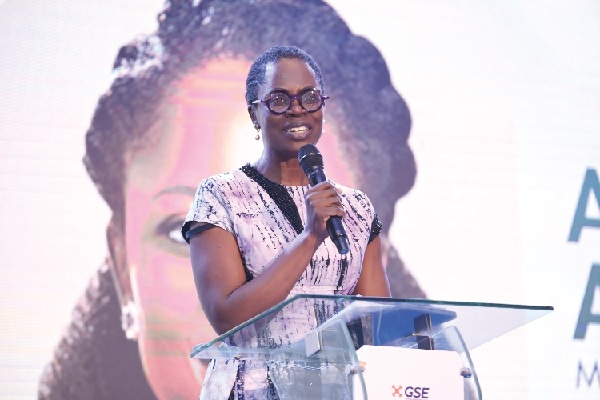THE Managing Director of the Ghana Stock Exchange (GSE), Abena Amoah, has appealed to the government to reinstate the zero per cent capital gains tax on listed securities, a policy that existed previously to encourage more investor participation in the market.b
She explained that the current taxation regime had made listed securities less attractive compared to other investment options, thereby affecting liquidity and overall market depth.
“The Ghana Stock Exchange has been among Africa’s best-performing exchanges over the past two years. But to soar higher, we need the right support — from policymakers, regulators and market participants.
“We are calling for a review of the capital gains tax on listed securities back to zero to attract more investors and deepen market liquidity,” she said.
Ms Amoah made the call last Wednesday at the 10th anniversary of the Ghana Fixed Income Market (GFIM) in Accra, on the theme: “Deepening Markets, Expanding Possibilities.”
She explained that in September 2025, the three-Tier Pension Scheme was launched following the enactment of the National Pensions Act in December 2008.
Those pension reforms, she said, had resulted in pension fund assets growing to over GH¢100 billion today, desperately looking for investible assets.
She emphasised that whilst government and businesses were looking for patient long-term capital, GSE was ready to facilitate that connection.
Therefore, she urged cabinet to approve the listing of viable state-owned enterprises on GFIM and other GSE platforms to raise capital and for improved corporate governance.
In addition, she called for the promotion of bond-backed Public-Private Partnerships (PPPs) for infrastructure financing, and issuance of municipal bonds and incentives for multi-nationals to localise their ownership using the GSE.
Growth
She explained that 10 years ago, Ghana's young capital market took a transformative leap forward – one marked by collaboration, innovation, resilience and progress that had fundamentally changed how the nation mobilised capital and finances development.
Reflecting on the beginning, she said “in August 2015, the Ghana Fixed Income Market was born into a fragmented landscape.
A time when bond trading was bilateral, obscure, and limited in scope. A time when price discovery and investor participation were restricted. But we dared to imagine something different.”
She said that, through the collective effort and shared vision of the Ministry of Finance (MoF), Bank of Ghana (BoG), GSE, Central Securities Depository (CSD), Ghana Association of Banks (GAB), Licensed Dealing Members of the GSE and ACI Ghana, a centralised, transparent and rules-based platform that was built had become one of Africa’s most dynamic and trusted debt capital markets.
“The story of GFIM is indeed one of resilience. From a modest 5.2 billion volume traded in 2015, we soared to 230 billion in 2022 — a remarkable 4,300 per cent growth in seven years! Then came 2023 — our greatest test — when the Domestic Debt Exchange Programme shook the market, and volumes dropped to 98 billion.
But true to the spirit of Ghana and the resilience that defines this market, we fought back. By 2024, trading volumes rebounded by 76 per cent to 174 billion. And as of October 2025, we had already reached 214 billion,” Ms Amoah said.
That, she said, was not just a recovery, but a testament to the strength of the foundations and the trust stakeholders continued to place in the market.
Building on recovery
The Governor of the Bank of Ghana (BoG), Dr Johnson Asiama, said the current macro indicators reflected a remarkable turnaround.
He explained that, as conditions improved, GFIM responded instinctively, seeing dealers return, secondary trading deepen and yields normalise.
However, he said structural gaps remained, particularly the dominance of government securities and limited corporate issuance. Therefore, he outlined three priorities for the next decade.
He stressed the need to operationalise an active repo and securities-lending framework to ensure continuous liquidity, adding that South Africa’s Bond Exchange achieved similar stability in 2005 by turning static holdings into circulating collateral. Ghana can and must do the same.
Secondly, he said the issuer base must widen, noting that “so far, corporates have raised about GH¢24 billion through GFIM, a commendable start, but from only a handful of issuers. At the same time, pension funds now hold over GH¢90 billion in GFIM assets, patient capital in search of productive use.”
“The opportunity is clear: link long-term funds with new issuers through credit-enhancement tools and guarantee mechanisms. Nigeria’s sovereign sukuk and Kenya’s green-bond model demonstrate that diversification strengthens both the market and the economy,” he added.
He commended the GSE’s new academy to prepare companies for market access, describing it as evidence that market deepening is moving from plan to practice.
Dr Asiama further urged the development of a real-time, end-to-end digital bond ecosystem linking GFIM with Ghana Interbank Payment and Settlement Systems Limited (GhIPSS) and Real-Time Gross Settlement (RTGS) platforms, following examples from Brazil and India.
With turnover at GH¢214 billion this year, the Governor expressed confidence that Ghana could anchor regional capital-market integration under AfCFTA and become Africa’s reference point for transparency and innovation in fixed-income markets.
National development
The Director of the Financial Sector Division at the Ministry of Finance, Louis Amoo, affirmed government’s commitment to strengthening Ghana’s capital markets and its role in national development.
He further commended GFIM’s role in helping to shape the country’s financial system.
“Firstly, it has improved public debt management by providing a reliable and transparent platform for issuing, trading and pricing government securities, thereby bolstering investor confidence.”
“Secondly, it has promoted private investment by enabling banks, state-owned enterprises and corporations to access long-term funding for key projects. Thirdly, it has enhanced domestic savings mobilisation by attracting a wider and more diverse investor base, including pension funds, insurance firms, mutual funds and retail investors,” he stated.
